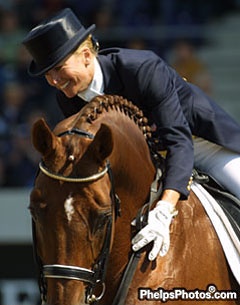
At the 2004 Bundeschampionate the absence of some of the best young horses in Germany was striking. No Florencio, no French Kiss, no Fazzino, no Baroncelli. More and more, dressage competitions become intertwined with strategy and business tactics, while sportsmanship, fair play and fun are fading away.
The big winners at the 2004 World Young Horse Championships were not in Warendorf to prove their worth and quality. Nowadays, it has become more important not to loose a title, than trying to win another one with the chance of failing along the way. "No Guts, No Glory," does this no longer apply to dressage?
Business has taken over competition sport and this is leading to some dramatic observations. In the Riding horse (materiale) classes in Warendorf, the 3 and 4 year old stallions were presented in a Prix St Georges frame and horses were muscled like a 6 year old. For the stallions winning a title is extremely important to gain more breedings next breeding season. Owners push riders to push horses. And, then, when you see a 3 year old moving like a normal good quality three year old, the judges sent him back home with a low score and the audience complains that "the stallion is "very unimpressive." It's a catch 22 for rider, owner, judge and viewer.
The money mentality at competitions is obvious from the first step you take in your decision to compete: the entry fee. Show organizers convince top notch riders to participate at their show (in order to lure a bigger crowd) by paying them 10,000 euro and even more, while other, not so famous riders, have to cough up a 3,000 euro entry fee in order to get the chance to compete at a show. This is clipping the wings of B-listed riders to fly into an A-team, and cementing an ivory tower position of the top riders by giving them such privileges.
So what can be done about it. A good starting point would be the 2004 Global Dressage Forum in Hooge Mierde, The Netherlands, where dressage judges, trainers and riders from all over the world gather to discuss the future of the sport. Once again I plea for a judging that awards the training of the young horse, according to his age, conformation and potential, a training that rewards the harmony between rider and horse. There should be put an end to the high scoring of artificial movements of stressed out horses and artificial training, that reflects an aggressive subordination of the horse to the rider. Fairness in judging will lead to a fairer, more pleasant sport in which riders and horse owners dare to take risks and have the guts again to go for the glory.
--Astrid Appels
info@eurodressage.com